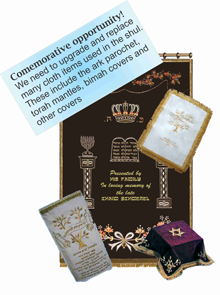The source for the Mitzvah of brit Milah is in Bereishit Chapter 17 Verses 9 – 14. The Torah teaches us that it is a positive commandment for a father to personally circumcise his son when his child is eight days old.( If the father is not competent to perform the Brit he may appoint a mohel to do so on his behalf).
Rabbi Epstein in his work Oruch Hashulchan explains why this mitzvah is different to the other mitzvoth. Other Mitzvot are observed with the individuals consent. This mitzvah is the very essence through which the Jew enters into the sanctity of the Jewish community. The Torah therefore declares that as soon as the child reaches eight days he should enter this holy covenant.
The Maharal teaches us about the significance of this mitzvah taking place on the eighth day. The order of the creation involved cycles of seven( 7 days of creation, 7 days ina week, 7 years of shemittah – agricultural cycle). The number 8 alludes to the spiritual world, which is beyond the mundane. The Brit Milah ceremony is thus elevated to being something far more significant than a physical change to ones body.
The Bris always takes place on the 8th day; the day of birth counting as day one ( ie if a child is born on a Tuesday the bris would be on the following Tuesday) It is preferable to perform the Brit in the morning to show ones enthusiasm to perform this mitzvah.
The Brit is postponed if the child is ill( eg jaundiced or premature). If a child is born on Shabbat the bris will then take place on the following Shabbat only if it was a natural birth. If the birth was via Caesarian then the Bris takes place the following day( Sunday).
The main honours at the ceremony are the Sandek and Kish shel Eliyahu. The Sandek is the person who holds the baby when the mohel performs the circumcision. The honour of Kiseh Eliyahu is placing the child on a chair designated as the chair of Eliyahu, while the mohel reads out certain passages. Tradition teaches us that in recognition of Eliyahus religious zeal it was ordained that no Bris would be celebrated except in his presence.
Other Requirements:
- It is best to have a minyan present – however a bris is still performed even without a minyan
- A seudat mitzvah, festive meal should take place after the Bris
- If a bris takes place on a fast day (this can even be Yom Kippur) the festive meal is made at night.
Naming
There are many customs regarding the chosing of a name for your baby. Speak to your Rav and Mohel who will be able to advise you on this matter.
Pidyon HaBen
It was originally intended that the first-born sons would constitute the priesthood (i.e. that the first born sons would all be Kohanim). In the wake of the incident of the Golden Calf(unfortunately the first-born participated in this event) the first-borns were considered unworthy of priesthood. The members of the tribe of Levi were chosen to be involved in the Temple service since they did not participate in this event. (They became known as the Levim) Aaron and his descendants were to become known as the Kohanim as the actually tried to stop the worshipping of the Golden Calf.
Since initially the first born were supposed to be Kohanim, they now had to be formally redeemed from that role. This is known as Pidyon Haben. At the ceremony a Kohen receives “ redemption money” from the father of the child in order to release him from kehuna(priesthood)
Some interesting facts:
- It takes place only if the mother and father are both Israelites
- It takes place on the 31st day following birth but not on Shabbat or Yom Tov.
- It takes place only if the baby is a first born child,(who is a boy), who is born of a natural birth i.e. not caesarian.
- It takes place if it is the first born child of the mother i.e. if a man is married for the second time , has children from his first marriage and this is his current wife’s first child the baby will have a Pidyon Haben.
- In the event of miscarriage, G-d forbid, consult your Rav with regard to this mitzvah.







